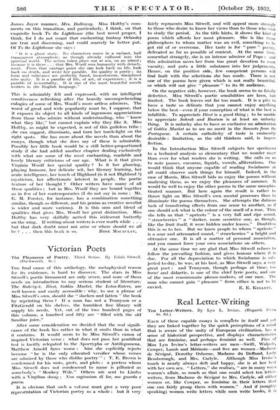Victorian Poets The Pleasures of Poetry. Third Series. By Edith
Sitwell. (Duckworth. 6s.) THE final cause of this anthology, the metaphysical reason' for its existence, is hard to discover. The stars in Miss Sitwell's poetic firmament are only seven, and none of them needs an introduction to any serious student of literature.' The Rubriiyit, Meet, Goblin Market, the Lobs-Eaters, are well known and easily accessible : why, to use a phrase of Miss Sitwell's own, should she " slacken and fatten " the book by reprinting them ? If a man has not a Tennyson or a FitzGerald on his shelves, the humblest free library will supply his needs. Yet, out of the two hundred pages of this volume, a hundred and fifty are filled with the old familiar juice."
• After some consideration we decided that the real signifi-' canoe of the book lies rather in what it omits than in what. it contains. It would seem to be Miss Sitwell's canon of inspired Victorian verse : what does not pass her pontifical test is tacitly relegated to the Apocrypha or Antilegomena. Matthew Arnold fares worse : him she e.rplicitly rejects" because " he is the only educated versifier whose verses • are admired by those who dislike poetry " : T. E. Brown is Condemned for his wots, grots. and plots : a poetess whom • Miss Sitwell does not condescend .to name is pilloried as • Somebody's " Monkey Wife." Others are sent to Limbo with a Virgilian shrug : Non ragioniam di kr, ma guards e passa.
it is obvious that such a volume must give a very poor' riprestiltation of Victorian poetry as a whole : but it very • fairly represents Miss Sitwell, and -will appeal more strongly to those who desire to know her views than to those who wish to study the period. As the title hints, it shows the kind of poem which affords her most pleasure. She is like those philosophers to whom matter was an evil, something to be got rid of or overcome. Her taste is for " pure " poetry, defecated as far as possible of content. At the same time, somewhat strangely, she is an intense admirer of Pope : and this admiration saves her from too great devotion to mere vacuity, and puts a little substance into her judgements, Hence, on the positive side,- few competent persons will find fault with the selections she has made. There is not one of the poems here given which is not really beautiful, or which will not give " pleasure" to its fit audience.
On the negative side, however, the book seems to us fatally defective. Miss Sitwell's poetic sensibilities are keen, but limited. ThC book leaves out far too much. It is a pity to have a taste so delicate that you cannot enjoy anything below the best—even if your conception of what is the best is infallible. To appreciate Hied is a good thing ; to be unable to appreciate Sohrab and Rustum is at least an unlucky thing. It is unlucky also to have so exclusive an admiration of Goblin Market as to see no merit in the Sonnets from the Portuguese. A certain catholicity of taste is eminently desirable : limitation, as the old thinkers said, is imper- fection.
In the Introduction Miss Sitwell subjects her specimens to a technical analysis so elementary that we wonder molt than ever for what readers she is writing. She calls on us to note pauses, caesuras, liquids, vowels, alliterations. One would think that anyone capable of reading Swinburne at all could observe such things for himself. Indeed, in the case of Morris, Miss Sitwell bids us enjoy the poems without analysing them, as we enjoy the pleasures of summer. It would be well to enjoy the other poems in the same unsophis- ticated manner. But here again the result is rather to throw light on Miss Sitwell's own mental processes than to illuminate the poems themselves. She attempts the dubious tusk of transferring effects from one sense to another, as if one should ask what is the colour of the smell of a rose. Thus she tells us that " apricots " is a very full and ripe sound, " strawberries " a " darker, more secretive one, as though, like the fruit itself, it were hidden under leaves." Doubtless this is so to her. But we know people to whom " apricots " is a sour and attenuated sound, " strawberries " a bright and obtrusive one. It is all a matter of personal association, and you cannot force your own associations on others.
At the same time we are glad that Miss Sitwell refuses to follow the prevailing fashion, and gives honour where it is due. For all the depreciation to which Swinburne is sub- jected to-day, he was, at his best, as Miss Sitwell says, a very great poet : and Tennyson. though perhaps at times too borne and didactic, is one of the chief lyric poets, and one of the most consummate phrase-makers, of our race. The man who cannot gain " pleasure" from either is not to be












































 Previous page
Previous page